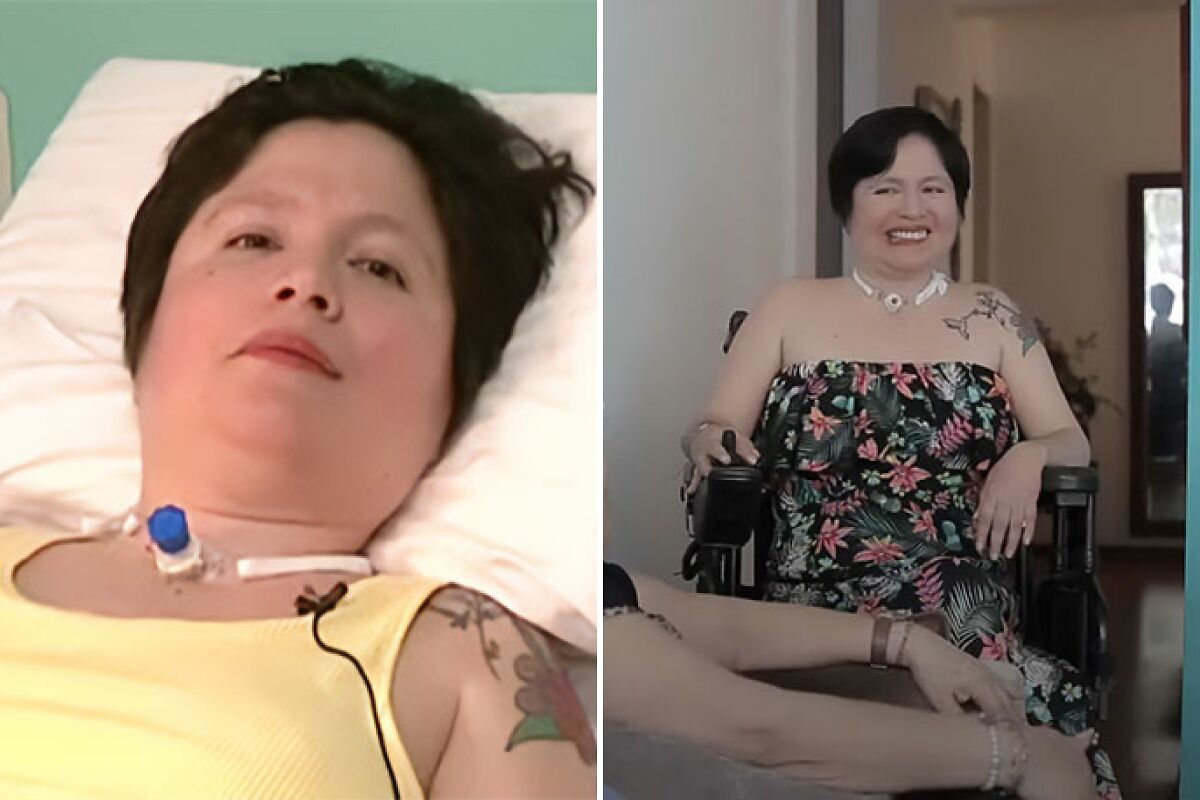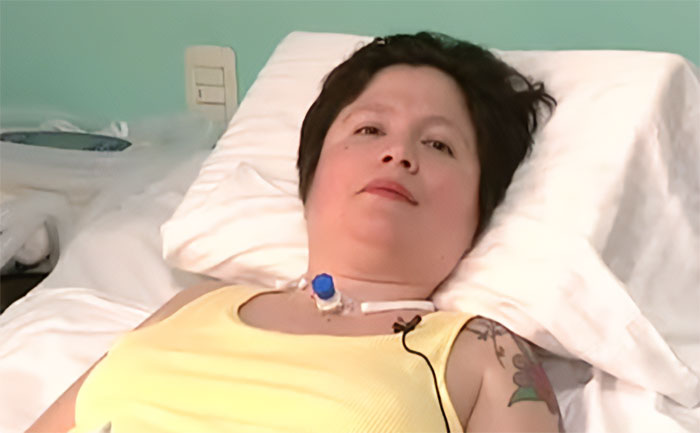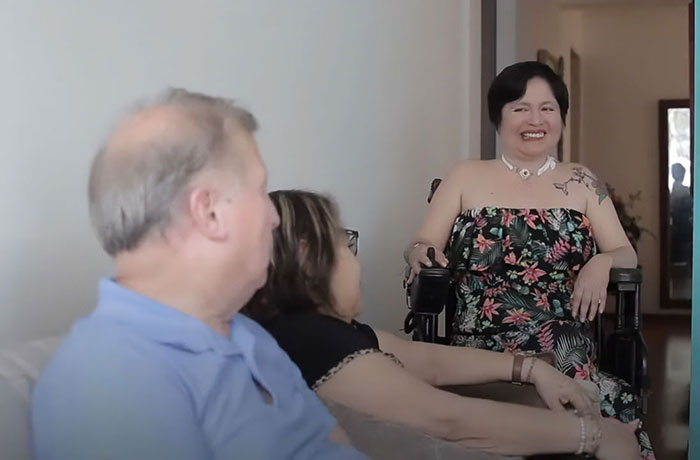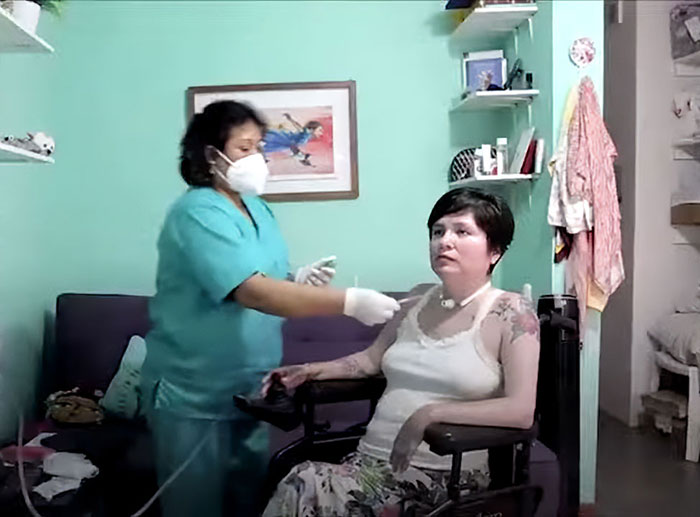
Woman Finally Euthanized In Peru Amid Legal Battle, Lived With Incurable Disease For 30 Years
Trigger warning: euthanasia, incurable disease
A 47-year-old woman in Peru living with an incurable and degenerative illness was granted the right to euthanasia amid a long and painful court battle, trailblazing the country’s laws regarding people’s choice to end their lives.
For the past thirty years, Ana Estrada, from Lima, Peru, lived with polymyositis, condemning her to stay bedridden and requiring a ventilator to breathe.
- Ana Estrada, living with incurable polymyositis for 30 years in Peru, was euthanized after a landmark court ruling.
- Estrada fought for access to euthanasia since 2016, challenging Peru's laws where euthanasia is illegal.
- Peru's Supreme Court granted Estrada an exemption for euthanasia, setting a potential legal precedent.
According to Johns Hopkins Medicine, polymyositis is a disease that causes muscles to become irritated and inflamed.
Ana Estrada, from Lima, Peru, was recently euthanized after living with polymyositis for 30 years in a groundbreaking legal case
Image credits: América Noticias
The muscles eventually start to break down and become weak. Additionally, the condition can affect muscles all over the body.
Experts think that polymyositis may be related to or triggered by a virus or an autoimmune reaction.
Following decades of pain, a lengthy court battle in the Peruvian capital ended in a landmark ruling, allowing her to end her life with medical assistance, Estrada’s lawyer, Josefina Miro Quesada, said on Monday (April 22).
Image credits: adn40Mx
Taking to X (formerly known as Twitter), Miro Quesada announced that her client officially died on Sunday (April 21).
Estrada, who used to work as a psychologist, went to court in 2016 to fight for access to euthanasia, which is illegal in Peru, Reuters reported.
As of 2023, euthanasia is legal in Belgium, Canada, Colombia, Luxembourg, the Netherlands, New Zealand, Portugal (law not yet in force, awaiting regulation), Spain, and all six states of Australia.
Announcing Estrada’s death on social media, her lawyer said she had “exercised her fundamental right to a dignified death”
Image credits: Josefina_28
Euthanasia must not be confused with assisted suicide, which is legal in Austria, Belgium, Canada, Germany, Luxembourg, the Netherlands, New Zealand, Portugal, Spain, Switzerland, parts of the United States, and all six states of Australia.
According to the Maxim Institute, euthanasia is when an attending medical or nurse practitioner takes an action with the singular intention of causing a patient’s death. Generally, this is in the form of a lethal injection.
Meanwhile, assisted suicide is when a suicide is intentionally aided by the attending medical or nurse practitioner, and the person self-administers the medication. That is, the medical practitioner will prescribe a lethal drug that the patient will usually take orally.
Image credits: adn40Mx
In 2022, Peru’s Supreme Court reportedly confirmed a ruling that gave Estrada an exemption to end her life.
“Ana has left us grateful to all the people who helped give her a voice, who were with her through this fight and who supported her decision unconditionally, with love,” Miro Quesada said, as per Reuters.
In an interview with Reuters published in July 2022, following her court win, Estrada said she hoped her case would set a legal precedent for the right to assisted suicide (it is currently unclear whether Estrada died by euthanasia or assisted suicide).
Estrada was left bedridden and required a ventilator to breathe before being finally euthanized on Sunday (April 21)
Image credits: América Noticias
Under Peruvian law, assisting someone’s suicide and killing terminally ill patients are punishable with prison time.
While the Supreme Court ruling did not legalize assisted dying, it exempted the doctor who supplied the drug to end Estrada’s life from any punishment.
“There will come a time when I will no longer be able to write, or express myself,” Estrada said at the time. “My body fails, but my mind and spirit are happy. I want the last moments of my life to be just like this.”
Image credits: Associated Press
The reason it took two years for Estrada to finally be euthanized is unclear for now.
Bored Panda has contacted Miro Quesada for comment.
“We treat our dying pets better than we do humans,” a reader commented

Poll Question
Thanks! Check out the results:
I think euthanasia or assisted suicide should be options available for all patients with incurable as well as terminal conditions. Patients with degenerative conditions, especially dementia, should also be able to make the choice in a living will to be euthanised at a specified degree of impairment/deterioration. Keeping the body alive after the brain has deteriorated to the point that the patient is in a state of constant distress or catatonia, is pointless cruelty to all involved. People should have the right to die with dignity, and to give their loved ones the mercy of a humane end rather than months or years of distress. I write this as someone with chronic illness and disability: death is a gift. I can envisage a time when my pain will be unmanagable, when I will be wholly dependent on others for personal care, and when I will be helpless and distressed. I would like to make a swift, graceful exit, not linger in distress and indignity.
I agree with you. If I might just add something: there was a court case in the Netherlands in 2019 about a doctor who gave euthanasia to a woman with dementia. The woman had previously (before her illness, I believe) stated that she wanted this, but when ill, she gave "mixed signals" and struggled against the injection. I believe that illnesses such as dementia or depression can make it very hard to establish consent and this can be difficult for both the patient and the doctor. This does not mean euthanasia should not be available but I think the more accepted it becomes, the more we need to think about these "border" cases and how to handle them.
Load More Replies...I think euthanasia or assisted suicide should be options available for all patients with incurable as well as terminal conditions. Patients with degenerative conditions, especially dementia, should also be able to make the choice in a living will to be euthanised at a specified degree of impairment/deterioration. Keeping the body alive after the brain has deteriorated to the point that the patient is in a state of constant distress or catatonia, is pointless cruelty to all involved. People should have the right to die with dignity, and to give their loved ones the mercy of a humane end rather than months or years of distress. I write this as someone with chronic illness and disability: death is a gift. I can envisage a time when my pain will be unmanagable, when I will be wholly dependent on others for personal care, and when I will be helpless and distressed. I would like to make a swift, graceful exit, not linger in distress and indignity.
I agree with you. If I might just add something: there was a court case in the Netherlands in 2019 about a doctor who gave euthanasia to a woman with dementia. The woman had previously (before her illness, I believe) stated that she wanted this, but when ill, she gave "mixed signals" and struggled against the injection. I believe that illnesses such as dementia or depression can make it very hard to establish consent and this can be difficult for both the patient and the doctor. This does not mean euthanasia should not be available but I think the more accepted it becomes, the more we need to think about these "border" cases and how to handle them.
Load More Replies...

















49
8